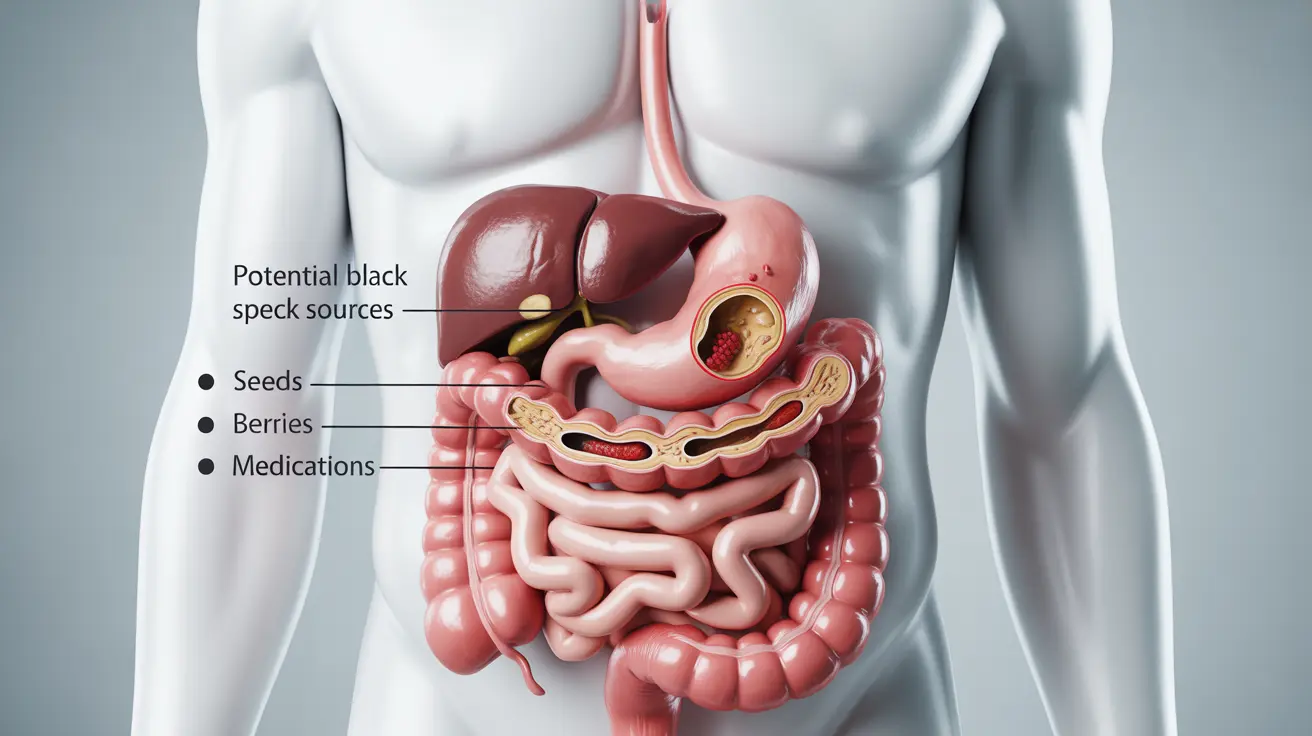Finding black specks in your stool can be concerning, but understanding the potential causes and knowing when to seek medical attention can help put your mind at ease. While some causes are harmless and diet-related, others may require medical evaluation to rule out serious conditions.
This comprehensive guide will explore the various reasons behind black specks in stool, help you identify warning signs, and provide guidance on prevention and treatment options.
Common Causes of Black Specks in Stool
Several everyday foods and substances can cause black specks to appear in your stool:
Dietary Sources
- Black seeds (sesame, poppy, or chia seeds)
- Dark berries or grape skins
- Black pepper
- Coffee grounds
- Dark chocolate or cocoa powder
- Iron supplements
- Activated charcoal supplements
Medical Causes
- Partially digested blood from minor gastrointestinal bleeding
- Certain medications, particularly those containing bismuth (like Pepto-Bismol)
- Digestive tract infections
- Parasitic infections
- Internal hemorrhoids
When to Be Concerned
While many cases of black specks in stool are harmless, certain symptoms warrant immediate medical attention:
- Black, tarry stools (melena)
- Persistent or increasing amounts of black specks
- Accompanying symptoms such as:
- Severe abdominal pain
- Unexplained weight loss
- Fatigue or weakness
- Fever
- Changes in bowel habits
Diagnostic Process
If you're concerned about black specks in your stool, your healthcare provider may recommend:
- Stool sample analysis
- Blood tests to check for anemia or infection
- Endoscopy or colonoscopy
- Imaging studies such as CT scans or MRIs
- Food diary analysis to identify dietary causes
Prevention Strategies
To prevent diet-related black specks in stool:
- Keep track of foods containing small, dark seeds
- Chew food thoroughly
- Consider grinding seeds before consumption
- Stay hydrated to aid digestion
- Monitor supplement intake
Treatment Approaches
Treatment depends on the underlying cause:
- Dietary causes: Modification of diet or eating habits
- Medical conditions: Appropriate treatment for the specific condition
- Medication-related: Potential adjustment of medications under medical supervision
- Bleeding sources: Medical intervention to address the source of bleeding
Frequently Asked Questions
- What are the most common foods and medications that cause black specks in stool?
The most common dietary causes include black seeds (sesame, poppy, chia), dark berries, black pepper, and coffee grounds. Medications containing bismuth (like Pepto-Bismol) and iron supplements can also cause black specks to appear in stool.
- When should I be worried if I see black specks or black, tarry stool in my bowel movements?
Seek immediate medical attention if you notice truly black, tarry stools, if the black specks persist or increase, or if you experience additional symptoms like severe abdominal pain, unexplained weight loss, or fatigue.
- Can black specks in stool be a sign of gastrointestinal bleeding or other serious health issues?
Yes, black specks can sometimes indicate gastrointestinal bleeding, particularly if accompanied by other symptoms. However, many cases are benign and related to diet. A healthcare provider can help determine the underlying cause.
- How is black specked stool diagnosed and what tests might my doctor order?
Diagnosis typically involves a physical examination, stool analysis, blood tests, and possibly endoscopic procedures or imaging studies. Your doctor may also request a food diary to identify potential dietary causes.
- What steps can I take to prevent black specks from appearing in my stool?
Keep track of foods containing dark seeds, chew thoroughly, consider grinding seeds before eating, stay well-hydrated, and monitor supplement intake. If black specks persist despite dietary changes, consult a healthcare provider.




